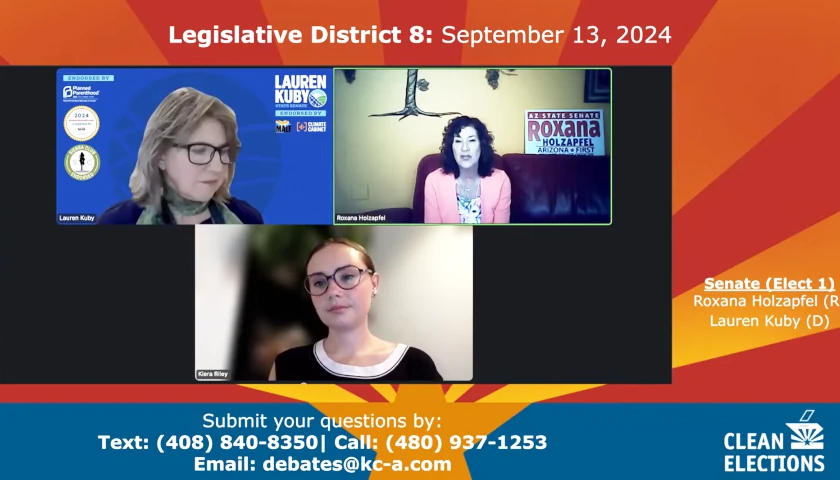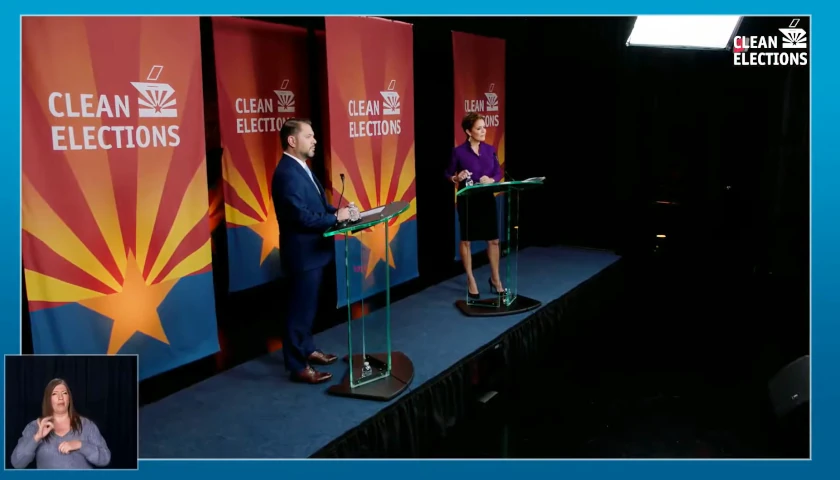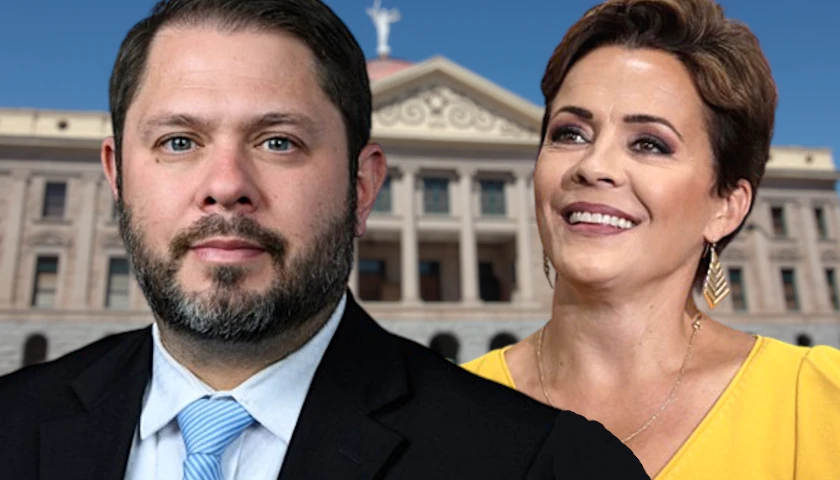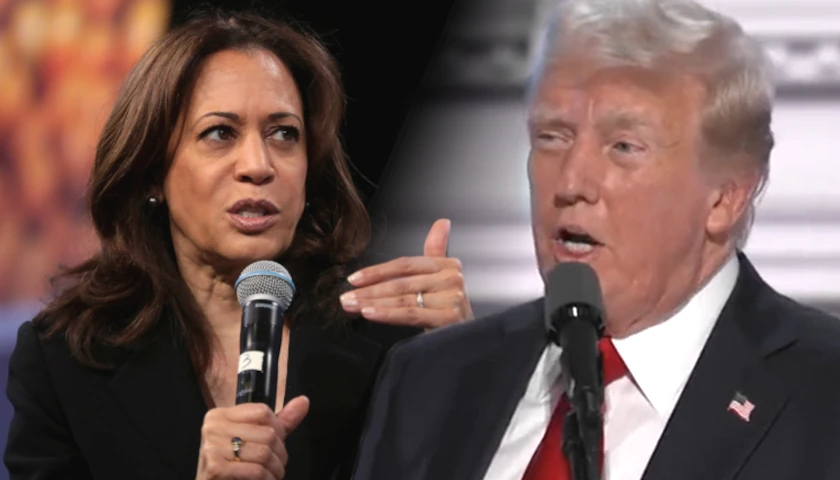In a highly contentious race for Arizona’s Legislative District 8 Senate seat, Democrat Lauren Kuby faced off in a debate against newcomer Roxana Holzapfel, a Republican small business owner and former police officer. With the election fast approaching, both candidates are vying to capture the attention of voters in a district that has become a focal point of political tension.
Kuby – described by Holzapfel as a “perennial candidate” – is running on a far-Left progressive platform in the Tempe-based district touting union endorsements and her championing of Proposition 139, which critics argue allow abortion up until birth.
Kuby described herself in her opening statement as a “proven advocate for environmental consumer and worker protections. I spearheaded Tempe’s Climate Action Plan, as well as innovations in … solar energy adoption. … My values and vision … embrace social, environmental, racial and economic justice … I’m running to be a champion for climate solutions, for abortion access…”
The two candidates were asked by moderator Kiera Riley, a reporter with the Arizona Capitol Times, if Arizona’s tax codes need to be changed, and if so, how.
Kuby said that the flat tax enacted under Governor Doug Ducey “resulted in $1.8 billion in cost to the taxpayers.” She said, “We need to be incentivizing climate action and positive social change.”
When Ducey signed the flat tax legislation in 2021, he said it would do the opposite, put an average of $300 back in the pockets of taxpayers each year.
Holzapfel responded and said the state needs to “reign in overspending.” She said Kuby has “such disdain and contempt for Tempe city officials.”
In contrast, Holzapfel said she “would be the champion of the taxpayer and watchdog, making sure that no one is overspending in our state government. In our state government, there are legislators in the capital that force trained to get whatever pet projects they want and sell out the taxpayer and burden them with higher costs.”
She went on, “I will prioritize the taxpayers in my district, not special interests. … We have to stop with the subsidizing of green wastes.”
Riley asked the candidates if they had a plan to improve affordability in housing.
Holzapfel responded, “Affordable housing … really means subsidized housing. So how does my opponent intend to pay for all these subsidies? Well, I believe she wants to use taxpayer dollars from people who are working and providing for themselves.”
Holzapfel listed off multiple avenues of assistance for homeowners.
“Our district offers programs such as first time homebuyers’ assistance, bringing deferred loans to first time homebuyers. We have multiple housing boundary programs, including veterans’ programs. There’s funding for emergency repairs so residents can stay in their homes. We have a mobile outreach team to support homeless families in Tempe. We have two hotels that have been secured that are being used for homeless families.”
Kuby declared that “housing is a human right.” She observed that “Kamala Harris is very interested in this issue” and emphasized the “public investment.”
Riley asked the candidates what was the most consequential action taken by Governor Katie Hobbs since she’s held that office. Kuby said Hobb’s Proposition 123 plan to invest in public schools, which she wants to “expand.”
She added, “But sadly, you know, she’s hampered by a legislature that is quite extreme. It’s often referred to as the most extreme legislature in the state of Arizona.”
Holzapfel responded, “The governor has been in court since day one.”
She accused Kuby of only talking about a Democratic agenda. “Would you like to elaborate on any specific work for all the people in Arizona, not just her party that I’m hearing from my opponent, that everything’s about Democrat. Democrat. It’s about the people of Arizona. It’s about Democrats, independents, Green, Republican. All of us live in this state, and our governor is supposed to speak and work for all of us, not just the Democrats.”
Next, the two were asked about how to keep teachers from leaving the school system and how to attract new teachers. Holzapfel, who is Hispanic, cited the success of Educational Savings Accounts (ESA). She said, “There are over 76,000 children enrolled in that ESA program, and 61 percent have come from the public schools. These children come from every race, religion and every local party. The school districts that touch our district aid have around 11,197 students in the ESA program. There are teachers that have left public schools to teach in the ESA program. Our ESA program is the first of its kind in the country. It is the gold standard. Other states are copying it.”
She added, “The ESA makes up a tiny fraction of our state budget. There’s $800 million in the ESA program and our state budget is $16.1 billion. So it’s not true to say that’s a lot. In fact, the public school system must have so much extra money because they send their school board members on lavish trips in Napa Valley, and on the taxpayers’ dime. So I would ask my opponent, because she wants to get rid of the EFA program, which of these 11,197 children would she get rid of first?”
Kuby said Arizona ranks almost last in the country for spending on schools and teachers. However, Arizona still regularly tops the rankings of states for educational achievement. A recent Center for Education Reform study ranked Arizona No.1 among the states for academic growth and charter schools.
Matthew Ladner, director of the Arizona Center for Educational Opportunity, a researcher with the Arizona Charter Schools Association, and former vice president of research for the Goldwater Institute, spoke with The Arizona Sun Times about this in 2022, asking, “If you had to choose between states with the most funding or states with the most academic growth, which one would you choose?”
Ladner told The Sun Times about the Stanford Educational Opportunity Project, which analyzed academic progress in schools across the country from 2008 to 2018 and found that Arizona beat out all 49 other states.
Kuby claimed that “ESAs are bankrupting our treasury, and it’s bankrupting our schools, and it’s to the tune of $714 million.”
However, the nonpartisan research group Common Sense Institute Arizona issued a report that found ESAs won’t bankrupt the state because the increase in spending on them is “eaten by the money Arizona saves by students leaving district schools.”
Holzapfel retorted, “Well, just because my opponent says it doesn’t make it so. You can go on and you can look at all this public information in the reports. [We need to] audit the public school system yearly. … Listen, my kids went to public school. I’m sure my opponent’s kids went to public schools. I went to public school. Public schools are great, but they are not for everybody, and everybody deserves customized learning.”
Kuby said repeatedly that the money from ESAs goes mostly to wealthy families. However, the Goldwater Institute issued a report in 2019 that found that wasn’t true. “ESA students come from low-performing, low-income school districts in similar proportions as public school students overall, and contrary to previous claims, ESAs generate equitable funding for students regardless of their economic background,” the report found.
“The 10 districts where ESAs are most popular in Arizona are overwhelmingly socioeconomically disadvantaged,” the report said. “The three districts with the highest concentrations of ESA students have child poverty rates more than double the state average. ESAs serve hundreds of students from Native American reservations, where public school spending can exceed $16,000 a year, yet where thousands of students are trapped in public schools rated D or F by the State Board of Education.”
Holzapfel said it was “obvious” there is “adequate funding” since “we have money left over to send people on lavish trips.”
Kuby said, “It’s made worse by the state legislature dominated by extremists who prioritize policies like the voucher program.”
Holzapfel interjected and corrected her, “So one thing I do want to say, though, are, these are not vouchers. Vouchers are illegal, but this is an account that the money is financially compliant. They’re not vouchers. So let’s get that right.”
The candidates were asked whether they support Proposition 139, dubbed the “Right to Abortion Initiative,” which legalizes abortion up to nine months, including partial-birth abortions, removes requirements that doctors be involved, eliminates parental consent, and removes penalties for those who assist with obtaining abortions. Arizona’s current abortion law prohibits abortions after 15 weeks.
Kuby responded, “I very much support the access to abortion act, and I worked in my campaign to get a lot of signatures.” She talked about “legislative extremists have worked overtime to restrict their freedoms of women … we are really looking at legislative extremism here.”
She said, “I also want to dispel myths that we might hear tonight, but I hear them continually, that somehow all these abortions occur in the late term, or even, as our former president said, you know, occur after after birth, which is ridiculous, but 93 percent of abortions occur before 13 weeks. Only 1 percent are performed at 21 weeks or more, almost all because of the health of the mother.”
However, the pro-abortion Guttmacher Institute admitted there are over 10,000 partial-birth abortions per year, and most are elective.
Holzapfel pointed out that Democrats put Arizona’s old pro-life law restricting almost all abortions back into law in 1977, and 50 years later, due to Republicans crossing lines to vote with Democrats, repealed that law.
“We already have a 15-week abortion law,” she said. “It requires parental consent and a licensed physician. This is a common-sense law for common-sense people. The initiative on the ballot this November gets rid of the requirements for parental consent and a licensed physician.”
Riley asked the candidates how they felt about Proposition 314, the Immigration and Border Law Enforcement Measure. Kuby said it was “SB 1070 on steroids,” referring to the strict proposition passed in 2010, which activist courts partially struck down.
“We need to have the DREAM Act passed; we need to find pathways for citizenship for undocumented immigrants,” she said, “ensuring that people have access to legal representation. … I really salute the Florence Immigration Project for the work that we’re doing … our legislature has been embracing the hate and the rhetoric of hate around immigration.”
The Florence Immigration Project (FIP) provides free legal services, social services, and advocacy for illegal immigrants facing detention and potential deportation. In 2022, FIP served over 30,000. It receives funding from a long list of foundations.
Holzapfel said, “So coming across our borders, our country, other than legal entry, is breaking the law. This harms jobs here for people who came in lawfully. My grandparents came here lawfully. Everybody wants legal immigration. We need to have legal immigration. But never before has Arizona experienced this level of mass illegal immigration, with the federal crisis, the human trafficking and unknown dangerous enemies pouring through our southern border.
In Maricopa County alone, fentanyl deaths are up 5,000 percent since 2015. Prop. 314 makes it a class two felony. So, people knowingly selling fentanyl that results in death are now charged as a class two felony.
Kuby added, “Undoubtedly there would be racial profiling,” and said the law is “much more hateful” than SB 1070.
Holzapfel said, “This is not local police officers running around town and arresting people. … And since you bring up the current administration, there should have been no need for any type of a Senate bill or anything, because the current President — I believe we have a current president — she stopped everything we have in keeping our borders secure from the former President Trump.”
Kuby doubled down on her position on illegal immigration. “We need to really support the DACA program and then pass the DREAM Act finally and fully,” she said. “Undocumented immigrants pay far more into the system than they receive back in service. That is a proven fact. … I don’t believe this district supports that kind of hateful rhetoric.”
But a report provided to Congress earlier this year contradicted Kuby.
Steven A. Camarota of the Center for Immigration Studies said, “Illegal immigrants are a net fiscal drain, meaning they receive more in government services than they pay in taxes.” He explained, “The fundamental reason that illegal immigrants are a net drain is that they have a low average education level, which results in low average earnings and tax payments. It also means a large share qualify for welfare programs, often receiving benefits on behalf of their U.S.-born children.”
Hozapfel said, “I do think this district does support legal law. We need law and order, we need citizens that are here that follow the rules, didn’t cut in front of line in front of American citizens that are here.”
Riley asked the two women whether they supported Proposition 140, which she said “will eliminate partisan primaries in favor of an open primary?” Arizona already has open primaries, and independents can request a primary ballot from any political party. Several grassroots groups that studied the proposed measure said it would establish the controversial Ranked-Choice Voting.
Kuby responded, “It’s not a bill about ranked choice voting; that could come out of it, but it’s not a bill about ranked choice voting. I support rank choice voting.” She said she was “leaning no” but needed to do more research. She admitted she needed to do more research on all the propositions except the abortion one.
Holzapful said Proposition 140 is “unconstitutional.”
The candidates were next asked whether voters should be required to show ID to vote, including when dropping off their ballot. Holzapful expressed her concern that 9,000 votes were not counted in the 2022 race for Attorney General, even though the candidates ended up only 280 votes apart.
She went after Kuby, labeling her a “perennial candidate, who party bosses picked to run in a vote. … My opponent left city council to run for Corporation Commission, which she lost. She then ran for the SRP board, where she lost severely. She really wants to be mayor in 2028 so this Senate seat opportunity just fell into her lap.”
“I have endorsements from multicultural groups and police organizations, and she has special interest groups and out-of-state PACs,” Holzapfel went on. “My opponent also has been endorsed by a communist organization.”
For her response, Kuby said, “You can’t ignore the fact that not everybody has a driver’s license, not everybody has a state ID.” She said the law is a “definite act of voter suppression.”
Holzapfel said, “IDs are free for people who can’t pay for them, and I can’t think pretty much of anything that you don’t need an ID for, so that that doesn’t fly. The vote is sacred.”
Kuby responded, “Low-income individuals and seniors and those in Native communities, they may not have access to the same photo IDs that you have.”
She defended her work with the organization that Holzapfel referred to as communist.
“I treasure my endorsements, as well as the one from the Arizona Working Families Party. They work for social, economic, environmental, racial justice. They are representing working families in Arizona who are really on hard times. And I know there’s smaller and smaller way halfway, narrow and narrower pathway to the middle class in Arizona, in our country. I am so proud of their endorsement.”
The Communist Party USA features the Working Families Party (WFP) on its website. The WFP endorses radical leftist candidates like Senators Bernie Sanders and Elizabeth Warren.
Holzapfel discussed her own endorsements.
“My endorsements are from police departments or from multicultural organizations — here, locally. I’m not a politician, a career politician, like Miss Kuby is. So she’s got out of state PACs, she’s got out of state union money. All I have is the support of friends.”
She brought up WFP again. “The Working Parties, that is a communist organization. So go to the website, check them out and what they’re wanting to do. It kind of saddens me that she’s so excited about the endorsement.”
Kuby doubled down defending her union endorsements, listing them all. They included the Planned Parenthood Action Fund, the Sierra Club, SEIU, Stonewall Democrats, Jane Fonda Climate Pact, and Moms Demand Action Gun Sense.
Riley said a viewer asked Holzapfel what her definition of communism was. Holzapfel said her grandfather left Cuba to escape communism. “You will do what we say,” she said. “You will buy what we tell you to buy. You will eat what we tell you to eat. You will think what we think, and you don’t have a say about it. That’s communism. It failed.”
For her closing statement, Kuby discussed her previous accomplishments while serving on the Tempe City Council. “What I got accomplished creating the Office of Sustainability, and, you know, eight new positions in the area of sustainability and energy and resilience, I was really proud of that accomplishment. … There is commonality, I believe is commonality with unions … Just be aware this is the most extreme legislature we’ve had in our history.”
The Arizona Legislature has very narrow Republican majorities in both chambers. Until the last few years, Republicans held significant majorities.
Kuby concluded, “I’ll champion climate action. We know we’re in the throes of climate crisis. … going to focus on climate solutions. … I’ll fight to protect reproductive rights … In the words of Michelle Obama, ‘Do something.’”
Holzapfel said for her closing statement, “We need to support our small businesses and bring back economic prosperity. We need to support and fund our police departments so our neighborhoods and streets are safe. We need to protect our children through all walks of life. I will sit down and work with our local governments. I’m committed to working with the residents of this district without special interest groups.”
– – –
Rachel Alexander is a reporter at The Arizona Sun Times and The Star News Network. Follow Rachel on X / Twitter. Email tips to [email protected].





